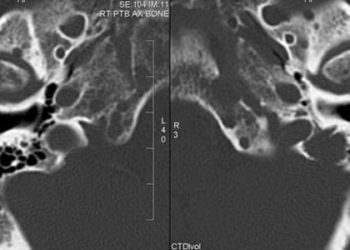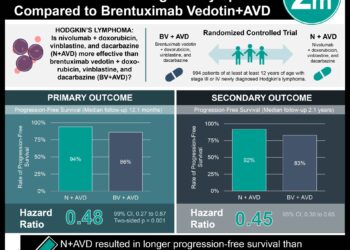Chimeric antigen receptor T-cell therapy elicits treatment response in patients with refractory B-cell lymphoma
1. Patients with refractory diffuse large B-cell or follicular lymphoma demonstrated high rates of remission when treated with anti-CD19 directed chimeric antigen receptor (CAR) T-cell therapy.
2. Serious adverse events noticed in this cohort included cytokine release syndrome and encephalopathy.
Evidence Rating Level: 3 (Average)
Study Rundown: Diffuse large B-cell lymphoma and follicular lymphoma comprise the two most common types of non-Hodgkin’s lymphoma. Both are primarily treated with rituximab-based chemotherapy regimens, however the prognosis for either cancer remains poor for patients that either relapse or are refractory to treatment. Adoptive immunotherapy, which uses T-cells expressing a CAR for B-cell CD19 antigens, has shown promising preliminary results as a treatment option for patients with B-cell cancers. This case-series assessed the efficacy of anti-CD19 CAR expressing T-cells (CTL019 therapy) in a cohort of 28 patients with refractory or relapsed diffuse large B-cell lymphoma or follicular lymphoma. Primary outcomes included response to treatment and evidence of toxic effects at 3 months post-treatment. Complete remission was observed in over half the patients at 3 months post treatment, and remission was maintained in many patients at 28.6 months post CTL019-treatment for both variants of non-Hodgkin’s lymphoma. Adverse events were also noted, including over half of treated patients experiencing cytokine release syndrome and/or neurotoxicity, with some patients experiencing severe cases of these adverse events.
Click to read the study in NEJM
Relevant Reading: Cellular immunotherapy in B-cell malignancy
In-Depth [case-series]: This case-series study enrolled 38 patients between 2014 to 2016, of which 28 ultimately received CTL019 T-cell therapy. Adult patients with either diffuse B-cell lymphoma or follicular lymphoma who had no further treatment options, an estimated survival time of 2 years or less, and who had refractory or relapsed disease after undergoing primary and salvage therapies were eligible. All patients underwent customized T-cell lymphodepletion regimens followed by CTL019 infusion. Patients were followed for a median of 28.6 months and were assessed for progression-free survival, response to treatment, and overall survival. At three months post-treatment, 18 of 28 (64%) patients had a noticeable response to treatment (95% confidence interval [CI], 44-81%), including 7 of 14 (50%) patients with diffuse large B-cell lymphoma (95% CI, 23-77%) and 11 of 14 (79%) patients with follicular lymphoma (95% CI, 49-95%). Though the median progression-free survival was not reached by the end of the study period, 57% of patients remained progression-free after 28.6 months (95% CI, 36-73%). Patients with follicular lymphoma did not reach median progression-free survival and 70% were progression-free at 28.6 months (95% CI, 38-88%). Median progression-free survival was 3.2 months for patients with diffuse large B-cell lymphoma (95% CI, 0.9 to not reached). At the median follow-up time, it was noted that 86% of patients with diffuse large B-cell lymphoma and 89% of patients with follicular lymphoma who had an initial treatment response maintained a treatment response (95% CI, 33-98% for diffuse large B-cell lymphoma; 95% CI, 43-98% for follicular lymphoma). Median overall survival was 22.2 months for patients with diffuse large B-cell lymphoma; the median overall survival was not reached among patients with follicular lymphoma and 93% of patients were alive at the median follow-up time. The main toxic effects noted were cytokine release syndrome and encephalopathy, of which 16 and 11 total cases were noted, respectively. Five of 16 patients had severe cytotoxic release syndrome; three of 11 patients had severe encephalopathy, which later resulted in one fatality.
Image: PD
©2017 2 Minute Medicine, Inc. All rights reserved. No works may be reproduced without expressed written consent from 2 Minute Medicine, Inc. Inquire about licensing here. No article should be construed as medical advice and is not intended as such by the authors or by 2 Minute Medicine, Inc.









